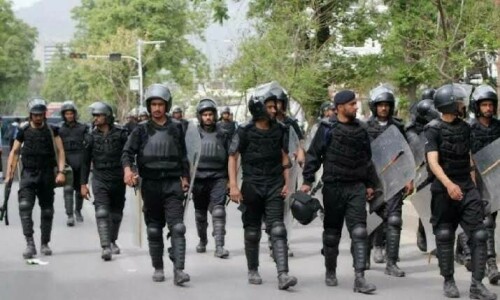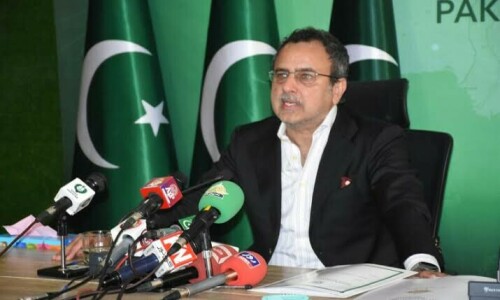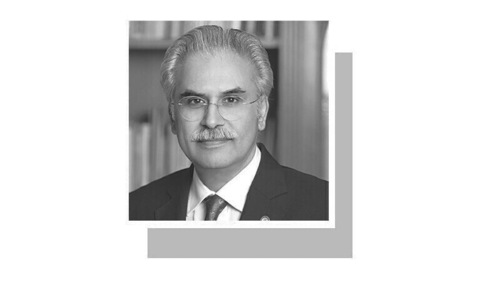WASHINGTON, July 16: The United States announced on Wednesday a senior US diplomat would attend international nuclear talks with Iran in the highest-ranking meeting between the two foes in three decades.
In a major policy shift, the White House said Under Secretary of State William Burns would attend the Saturday talks with Iran on a “one-time” mission to underline Washington’s conditions for ending the atomic stalemate.
In Tehran, supreme leader Ayatollah Ali Khamenei said that Iran was ready for negotiations over the nuclear crisis but warned it would not step over any “red lines” in the search for a deal.
White House spokeswoman Dana Perino said Burns would go to Geneva “to listen” to Tehran’s reply to an incentives offer for freezing uranium enrichment. “We are not there to negotiate,” she stressed.
The number-three US diplomat’s presence at the talks between EU foreign policy chief Javier Solana and Tehran’s nuclear negotiator Saeed Jalili will “clarify the consequences” — more sanctions — if Iran rejects the package, she said.
And Burns may restate US Secretary of State Condoleezza Rice’s offer to “meet with her (Iranian) counterpart anytime, anywhere, to move forward on negotiations of they would halt uranium enrichment,” said Perino.
Burns’s mission to Geneva, a reversal of US President George W. Bush’s past policy for grappling with Iran’s suspect nuclear program, comes with time fast running out for a solution before Bush’s term ends in January 2009.
“This will be a one time US participation to demonstrate that the P5 plus one ... is united in its longstanding principle that Iran, in order to take advantage of an incentives package that is quite generous, has to halt its nuclear enrichment,” said Perino.
The P5 plus one groups Britain, China, France, Russia, the United States — the five permanent members of the UN Security Council — and Germany in a diplomatic effort to end what the West fears is a covert nuclear weapons drive.
Asked whether this was final shot at ending the standoff without resorting to force, Perino replied: “What this does show is how serious we are when we say that we want to try to solve this diplomatically.” Recent, seemingly contradictory messages out of Iran on the incentives package are symptoms of an internal “debate” in the Islamic republic’s leadership on how to manage the standoff, she said.
The United States has no diplomatic relations with Iran and until now has refused to even participate in preliminary discussions with Iranian officials unless Tehran first suspends its nuclear enrichment activities.
Iran has repeatedly refused to heed UN demands to suspend uranium enrichment, insisting that its activities are exclusively aimed at energy production.
“No power can deprive Iran of nuclear technology,” state television quoted supreme leader Khamenei as saying. “Iran has decided to take part in negotiations but it will not accept any threat.
“Our red lines are clear and if the other parties respect the Iranian people, the dignity of the Islamic republic and these red lines, our officials will negotiate as long as no one makes any threats against Iran,” he said.
Washington broke off relations with Tehran in 1980 in the wake of the Islamic revolution and the seizure of the US embassy. Ties have remained severed ever since amid increasing acrimony over Iran’s nuclear program.
Last year, US and Iranian ambassadors broke with years of isolation and held talks focused strictly on security in Iraq.
Susan Rice, foreign policy advisor to Democratic presidential candidate Barack Obama, said the decision to engage the Iranians “”appears to be a positive step.” “It’s certainly in line with the kind of participation that we have said repeatedly would be constructive,” she told reporters. “It is now incumbent on the Iranians to engage seriously and take the opportunity to press ahead on negotiations to end their nuclear program.” Last month, the P5 plus one presented Iran with an offer of technological incentives in exchange for suspending sensitive uranium enrichment work.
European diplomats say Solana is proposing to Tehran that world powers would refrain from new sanctions provided Iran did not start operating any additional centrifuges to enrich uranium.
Israel and the United States have both refused to rule out military action against Iran, which has said any aggression would be met with a firm response.
“We have said clearly that if anyone takes any stupid action against Iran, our response will be decisive,” Khamenei warned.
Iran last week intensified tensions in the nuclear standoff by staging two days of missile tests, which included the firing of a missile that it says can reach Israel.—AFP












































Dear visitor, the comments section is undergoing an overhaul and will return soon.